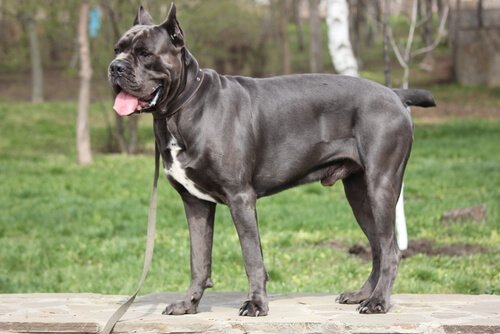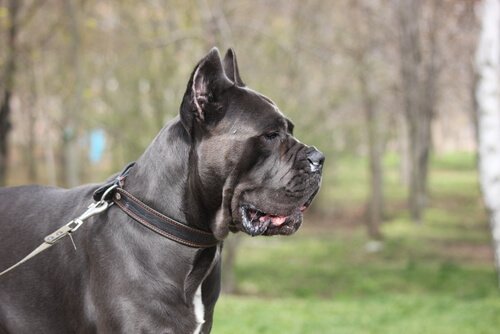Cane Corso

Currently, the most popular large-sized dogs are breeds that are made in laboratories, such as the Pit Bull or Doberman Pinscher. However, the Cane Corso is a dog with a strong build, impressive size, and it originates from all the way back from ancient Rome.
Also called the Italian Mastiff, this Mediterranean warrior participated in ancient wars. However, nowadays, he has left the battlefield in order to become the perfect grounds keeper.
The Cane Corso’s behavior is much more complex than their enormous strength and appearance. There is a saying that perfectly describes their personality: “not everything is what it seems.”
A Mild-tempered Dog
Upon first glance, people might think that they are violent dogs. But this is only based on prejudices because the Cane Corso is actually a mild-tempered dog by nature.
Their temperament is very restrained, calm, docile, and loyal. The Italian Mastiff is one of the smartest large-sized dog breeds. Their tolerance towards children is limited, although they hardly show signs of jealousy.
Well-rounded and proud, they aren’t the type of dog that goes crazy for no reason at all. In fact, their level of excitement is quite low, and so you’ll almost never see them lose control.
Protective dogs
They are extremely calm dogs with their owners and family. However, this dog can be very alert of strangers that approach the house. They will be on alert when noticing any sudden movements around the house or yard, they will be on alert.
In a nutshell, they are emotionally stable, but they don’t trust strangers. They understand that their duty is to take care of their territory. Therefore, some families get this breed for more security around the house.
These dogs understand that an important part of their life is protecting their owners. In addition, they can live with other dogs and protect them too.
A focused dog
The Cane Corso is a pet that doesn’t like to play a lot, especially as an adult. These dogs mostly spend a lot of time taking care of their territory and observing what happens in their surroundings.
They also aren’t very affectionate dogs, and they don’t connect well with children. When they bark a lot, it’s because everything is in order; but when they feel threatened, they become silent and stealthy.
Their nature makes them a great guard dog: they are muscular, heavy, strong, and will attack only if it’s absolutely necessary, especially because they can weigh up to 45 kilograms (100 pounds).

Acceptable levels of obedience
Training is a must to improve the pet’s good temperament. Training this breed won’t be impossible, but it will be difficult; their owners will have to be repetitive.
Apart from that, owners will be able to control them and have them become obedient. Therefore, the socialization process is very important, so training must begin when they are very young.
You should train them based on getting along with other dogs and carrying out their duties as a guard dog. The first is a necessity, the second is this breed’s true vocation.
What should you know about adopting them?
First of all, you need to have the legal papers that show their pedigree. This documentation is easy to get, and it’s not expensive at all. Be careful if the person selling you the dog refuses to provide it.
As for health, you need to have its veterinarian card, vaccines, deworming schedules, etc. The most common health problems are related to their weight and physical activity. We should also take care of their eyes and teeth.
Cane Corso: 3 basic recommendations
This animal’s coat is quite short and tight. Therefore, this dog is perfect for mild to hot climates. They can have certain difficulties adapting to extremely cold climates. Furthermore, adoption is recommended for owners that have houses with significantly large yards. The Cane Corso is territorial, and they have a lot of energy to burn.
Those who decide to get this breed will have to get used to long walks. In short, the Cane Corso is a muscular dog, perfect for protecting houses with yards in mild or hot areas. Don’t expect loving displays of affection from them, but rather fierce loyalty and defense.
